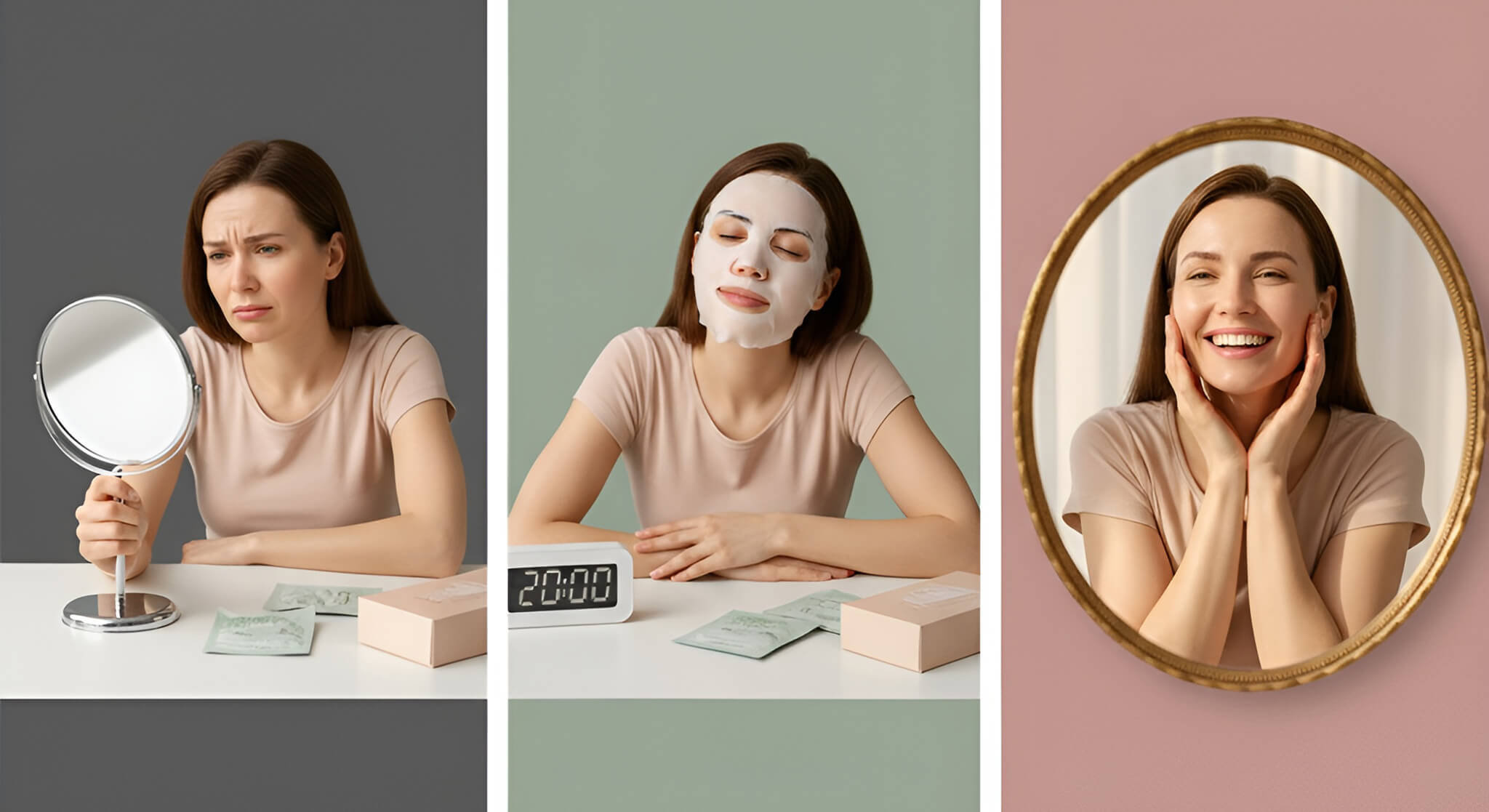Do Collagen Face Masks Work? The Science Behind the Temporary Plump
Table of contents
The Alluring Promise of a “Collagen Boost” in 20 Minutes
It’s one of the most tempting promises in the skincare aisle: a sheet face mask drenched in a collagen-rich serum that promises to plump skin, smooth wrinkles & fine lines, and restore a youthful bounce in just 20 minutes. The idea of topically applying the very protein our skin loses as we age is incredibly compelling and seems like a logical solution.
But from a scientific standpoint, can this actually work? Can the collagen molecule from a sheet mask penetrate your skin to rebuild its structure, or is it just a temporary, surface-level effect?
We’re diving into the molecular science of skincare to give you the definitive answer. This is a scientific case study on what collagen sheet masks can—and absolutely cannot—do for your wrinkles.
The Scientific Roadblock: The Collagen Molecule Is Too Big
To understand the verdict, we first have to understand the skin’s defense system.
A Lesson in Molecular Size
Your skin barrier is a brilliant and effective gatekeeper. It’s a tightly packed wall of cells and lipids designed to keep harmful things (like bacteria and pollutants) out and essential things (like water) in. For an ingredient to penetrate this barrier and reach the deeper layer of the skin (the dermis) where your own collagen is produced, it must have a very small molecular size.
The collagen molecule used in most skincare, even when it’s “hydrolyzed” (broken into smaller fragments), is simply too large to pass through this barrier.
The “Beach Ball Through a Keyhole” Analogy
Think of your skin barrier as a tightly woven brick wall. Trying to push a giant collagen molecule through it is like trying to shove a beach ball through a keyhole. It simply does not fit.
The Scientific Verdict: Because the molecule cannot penetrate to the dermis, the claim that a collagen mask can “add” or “replace” your skin’s own collagen is scientifically impossible.
So, What Are They Actually Doing? (The Real, Temporary Benefits)
If it’s not adding collagen, why does your skin look so plump and smooth after using one? The benefits are real, but they are based on hydration, not reconstruction.
They Are Elite Hydrators and “Plumpers”
The collagen molecule, while too big to get in, is an excellent humectant. This means it sits on the surface of your skin and binds to water. The sheet mask itself then creates an occlusive seal over your face, preventing that water from evaporating and forcing hydration—along with any other humectants in the serum like Hyaluronic Acid—into the very top layers of your skin.
The Result: This creates a powerful but temporary “plumping” effect. Your skin becomes super-hydrated, which temporarily fills out the appearance of fine lines and gives the skin a dewy, bouncy, and radiant glow. It’s a fantastic short-term fix for dehydration-related signs of aging.
The At-a-Glance Comparison Table: Claims vs. Reality
| Claim on the Box | Scientific Reality |
| “Adds collagen to your skin” | Myth. The molecule is too large to penetrate the skin barrier. |
| “Reduces wrinkles” | Temporarily, yes. By intensely hydrating and plumping the skin, which makes fine lines less visible for a few hours. |
| “Firms the skin” | Temporarily, maybe. The plumping effect can create a tighter, firmer appearance for a short time. |
| “Provides a youthful glow” | Yes. The intense hydration and occlusive seal from the mask deliver a very effective, radiant, dewy finish. |
The Verdict: A “Cinderella” Treatment, Not a Long-Term Cure
So, can collagen sheet masks really help reduce wrinkles? Yes, they can provide an immediate but temporary reduction in the appearance of fine lines, thanks to their powerful hydrating and plumping effects. Think of a collagen face mask as a ‘Cinderella’ treatment—it’s the perfect way to get a beautiful, glowing, and smooth canvas right before a special event or a big night out. It’s a fantastic tool for temporary rejuvenation. However, for true, long-term collagen building and wrinkle reduction, your daily skincare routine must rely on the proven power of ingredients that are small enough to penetrate the skin and signal cellular change. This includes daily use of serums with ingredients like Retinol, Vitamin C, and Peptides.
However, for true, long-term collagen building and wrinkle reduction, your daily skincare routine must rely on the proven power of ingredients that are small enough to penetrate the skin and signal cellular change. This includes daily use of serums with ingredients like Retinol, Vitamin C, and Peptides.
Related article:




